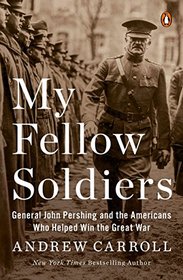While I'm very much into World War II histories and memoirs, I'm not very interested in World War I and seldom open a book on that period. However, I was very much delighted with this history which is supposedly centered on letters by John Pershing and some of the men and women in the American Expeditionary Force---including Captain Harry Truman. I say "supposedly," as the author jumps about a lot and used the letters as starting points. The book is a very enjoyable read and I learned much I didn't know. Plus, it doesn't get bogged down in the battles and tactics as many other WWI books do.
Some of the things I learned were about Pershing's 29-year "Courtship"---beginning in 1917---with a Romanian-born artist in her 20s who became Pershing's love for decades, marrying him less than two years before he died in 1948. This affair is alluded to in many books, but is discussed in some more detail here.
After the terrible death of Pershing's first wife and three of their daughters in 1915, Pershing eventually became enamoured with the his aide's sister. His aide was a young Lieutenant George Patton, and Anne Patton was of the belief she and Pershing would eventually marry. I guess there is some truth in "Distance makes the heart go wander."
I also learned, through the "Notes on Sources," that reported German atrocities in World War I, often considered to be just British and French propaganda, were later discovered to be true through German documents discovered decades later.
And I discovered Pershing wasn't the cool, emotionless man he is often described as. He often broke down and cried when visiting the wounded, but only when in the privacy of his staff car. Other examples of his true emotions are given throughout the book.
While I enjoyed the book, the author made at least two mistakes which really bewildered me. In one case, he refers to "cartridges" in rifles, when it is obvious he is discussing the rifles' magazines and not the bullets (page 202). And, in at least two spots (example on page 261), he refers to artillery shells as "bombs." How the author or his editors missed these mistakes is a wonder.
Finally, as a Viet Nam veteran myself, I was surprised to discover two of Pershing's grandsons also served in Viet Nam, and one died there while attempting to rescue another soldier. While Pershing would have grieved for his grandson, he would have been proud he died doing that.
Some of the things I learned were about Pershing's 29-year "Courtship"---beginning in 1917---with a Romanian-born artist in her 20s who became Pershing's love for decades, marrying him less than two years before he died in 1948. This affair is alluded to in many books, but is discussed in some more detail here.
After the terrible death of Pershing's first wife and three of their daughters in 1915, Pershing eventually became enamoured with the his aide's sister. His aide was a young Lieutenant George Patton, and Anne Patton was of the belief she and Pershing would eventually marry. I guess there is some truth in "Distance makes the heart go wander."
I also learned, through the "Notes on Sources," that reported German atrocities in World War I, often considered to be just British and French propaganda, were later discovered to be true through German documents discovered decades later.
And I discovered Pershing wasn't the cool, emotionless man he is often described as. He often broke down and cried when visiting the wounded, but only when in the privacy of his staff car. Other examples of his true emotions are given throughout the book.
While I enjoyed the book, the author made at least two mistakes which really bewildered me. In one case, he refers to "cartridges" in rifles, when it is obvious he is discussing the rifles' magazines and not the bullets (page 202). And, in at least two spots (example on page 261), he refers to artillery shells as "bombs." How the author or his editors missed these mistakes is a wonder.
Finally, as a Viet Nam veteran myself, I was surprised to discover two of Pershing's grandsons also served in Viet Nam, and one died there while attempting to rescue another soldier. While Pershing would have grieved for his grandson, he would have been proud he died doing that.




